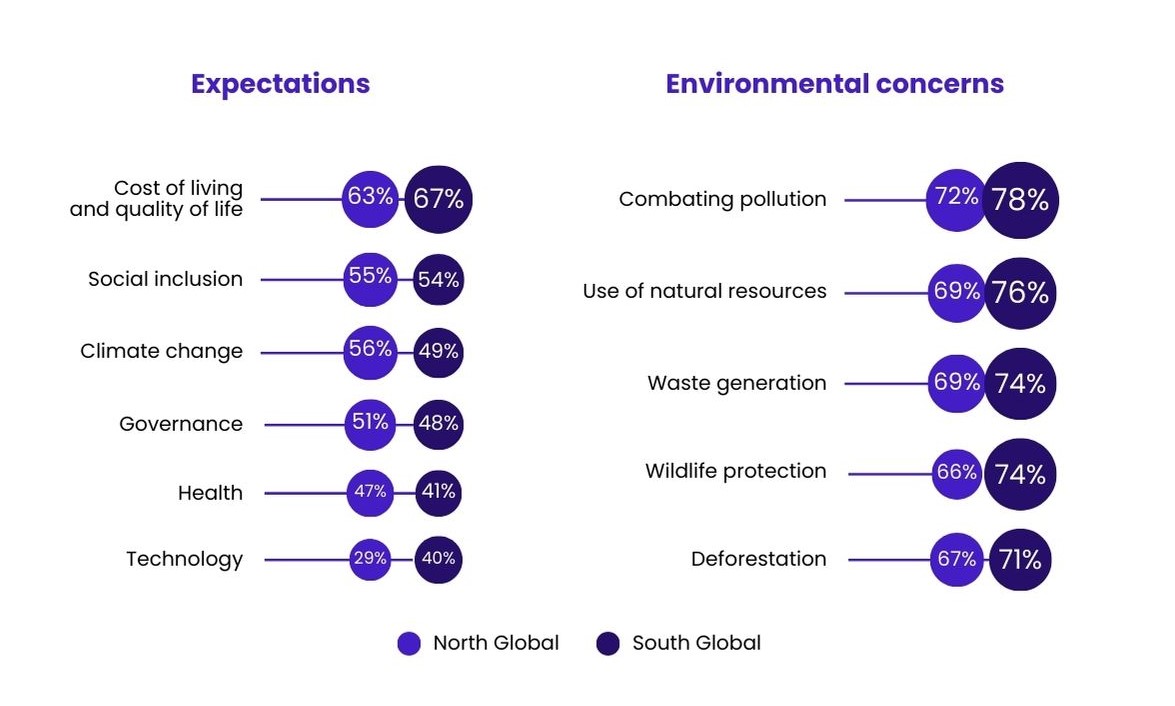Connecting the Worlds: A (necessary) Collective Action for a Sustainable future
Published July 4, 2024
- Change Management
- Compliance & Resilience
- Sustainability

The vision of the world presented by Ovid in the first century AD in his work, “Metamorphoses,” remains strikingly relevant today. The scale of contemporary upheavals—geopolitical, technological, societal, and environmental—serves as a powerful reminder of the crucial role of transformation. Just as Ovid’s stories emphasize change, modern organizations must embrace continuous adaptation to confidently navigate and thrive in an uncertain future.
What essential connections must be forged, and what critical changes must be achieved?
In an increasingly fragmented environment, connecting different dimensions is absolutely crucial for organizations to stay relevant and thrive. This not only defends their interests by enhancing resilience and future-readiness but also preserves the vital socio-economic and environmental balance essential for creating long-term value. To achieve this, organizations must boldly integrate digital, business model, and sustainability transformations while fostering a culture of innovation and embrace new leadership styles centered on listening, intercultural dialogue, continuous learning, and a deep understanding of complex issues to truly lead the change into the future.
Linking “Global North” and “Global South”
The first prerequisite for linking worlds is an interest in the major contemporary geopolitical issues, the new “lines of force” that structure international relations and global value chains, which are under increasing pressure (see, for example, the geo-economics of strategic natural resources, essential to the energy and ecological transition).
In June 2024, the first Latin American “PRIORITY FII” summit was held in Brazil, organized by the FII Institute (Future Investment Initiative, a global non-profit organization dedicated to creating the conditions for a better future for humanity), in which Wavestone participated.
In a global study called the “New Compass,” including 50,000 respondents in 23 countries and unveiled on this occasion, the FII Institute highlights humanity’s most pressing priorities, to help world leaders identify the best ways to meet these expectations. This study clearly shows that between the Global North and Global South, citizens’ priority environmental expectations and concerns are converging (see below).

Source: FII study, June 2024
This data fed into the discussions of the more than 1,500 delegates (government officials, business leaders from various sectors, civil society players), who gathered under the theme “Investing in Dignity,” to examine how investments in ecological transition, technologies, innovation and social inclusion can contribute to prosperity and build a new world order.
For me as a leader, my most powerful weapon was my ignorance. As you become more senior, going up the tree, questions are most important than statements. The power of a simple question is huge. It’s a matter of attitude, mindset, humility. A leader asking questions can have a strong impact on an organization’s system of values. It’s good to admit you don’t know, and it’s even better to go and try to find out. This is all about building a learning culture. You don’t only have things to learn from your friends but also from your competitors. Institutions and individuals must be curious and open about what is going on around them, to be intrinsically more resilient.
Linking “technology” and “sustainability”
While the digital transformation initiated 30 years ago is still underway, sustainable transformation is becoming a necessity, and could prove to be even more dizzying in scope. Rather than opposing them, it is in our collective interest to link these major transformations, enhance their synergies and optimize their impact, especially with the massive arrival of generative AI (artificial intelligence).
As part of the “Global Technology & Data Leaders Survey 2024” conducted by Wavestone, we questioned nearly 600 technology leaders (Chief Information Officers) in Europe, North America and Asia to better understand their perceptions of the impact of this disruptive technology in several dimensions of their activities (cybersecurity, reduction of environmental footprint, etc.). The results reveal that, although 46% of respondents claim to be already taking into account the environmental impact of generative AI in all their projects, the majority have not yet laid the foundations needed to fully seize the opportunities linked to the development of Generative AI, while bringing its specific risks under control. Risks that are largely neglected: only 27% of technology leaders are attentive to risks linked to intellectual property protection, 26% to hallucinations, 23% to prejudice and 17% to ethics. Nevertheless, it seems crucial to recognize and address these risks.
-
46% of respondents say they are already considering the environmental impact of generative AI in all their projects.
-
-
Leaders need to give their teams sufficient time, space and permission to try to do things more sustainably. You cannot just ask people to do things in a radically different manner, without creating the right culture of change. Change happens across multiple different layers inside organizations, it needs to happen from the ground-up and from the top-down, at different levels… Everyone inside an organization must be given a chance to find passion about sustainability, make it real. Connect what they do (their daily activities) with a greater sense of purpose. Find ways to make a concrete difference and achieve progress in their own roles and positions. We need to be more collaborative and learn from each other across generations, organizations, sectors, value chains…
Linking “expertise” and “player profiles”
Connecting worlds also means connecting knowledge and its producers. Interdisciplinary dialogue and hybrid methodological approaches are essential levers for effectively addressing the complexity of the world and guiding decision-making processes in a context of uncertainty. Academic and field players must join forces to pool their efforts and make their work more accessible.
Continuing a long-standing partnership, following a previous collaboration on the theme of air quality, Wavestone and Institut Veolia are preparing a joint international publication in 2024 (FACTS Report) exploring the links between climate, health and the environment.
The aim is to facilitate cross-fertilization of views on subjects at the crossroads of society and the environment, in a resolutely interdisciplinary approach that capitalizes on the expertise and best practices of various players (researchers, international organizations, NGOs, social entrepreneurs, public authorities, companies, etc.) in both developing and industrialized countries. In all, the publication (accessible to all) will bring together some twenty articles produced by leading researchers and players, freely sharing their analytical frames of reference and their convictions.
Connecting generations and encouraging debate
Linking worlds also means linking generations, giving younger people the opportunity to engage in regular dialogue with decision-makers and experts from the public and private sectors, to share their understanding of the issues and their ideas for concrete solutions for a sustainable future by encouraging open, objective debate based on concrete facts and tangible data.
For the past two years, Wavestone has worked with Stellantis to design and produce the “Freedom of Mobility Forum,” conceived by Stellantis as an annual debate and open forum for the public to hear a wide spectrum of viewpoints, as our companies face the challenges of future mobility in a low-carbon world.
Young people play a central role in this initiative. For the 2024 edition, which focused on the theme “How will our planet meet the mobility needs of 8 billion people?”, some 20 international students contributed from three partner campuses in Morocco (ENSA-Kénitra), the USA (The Heller School – Brandeis University) and France (HEC Paris). It was an opportunity for a no-holds-barred, honest, respectful and collaborative intergenerational dialogue on how planetary limits could lead to a rethinking of freedom of movement (from the angle of technologies, economic models and lifestyles).
*Results of a survey commissioned from the YouGov polling company by Stellantis and Wavestone for the Freedom of Mobility Forum, carried out in April 2024 on the basis of a sample of 5095 people in 5 countries (Brazil, France, India, Morocco, USA).
-
1/4, This is the proportion of the world’s citizens who believe that the younger generation holds the key to our future in terms of energy and ecological transition, with a response rate even reaching 40% in India, where youth is identified as the main drivers of change.
-
-
Our society has a duty to recreate prospects for the younger generations. The company must be a place where they can rediscover the pleasure of living together, the taste for action and the satisfaction of results. The younger generations are ready for this. Their capacity for commitment is intact, as is their sense of community. Let’s educate them. Let’s discuss our convictions. Profess the merits of nuance and perspective. Let’s open up our employees to other countries, other cultures, if they so wish. Let’s take this opportunity to rehabilitate the European ideal. Let’s demand that we behave as good corporate citizens, even (and above all) if this weighs on our figures in the short term. Our employees will be all the more motivated to recreate links within society.

